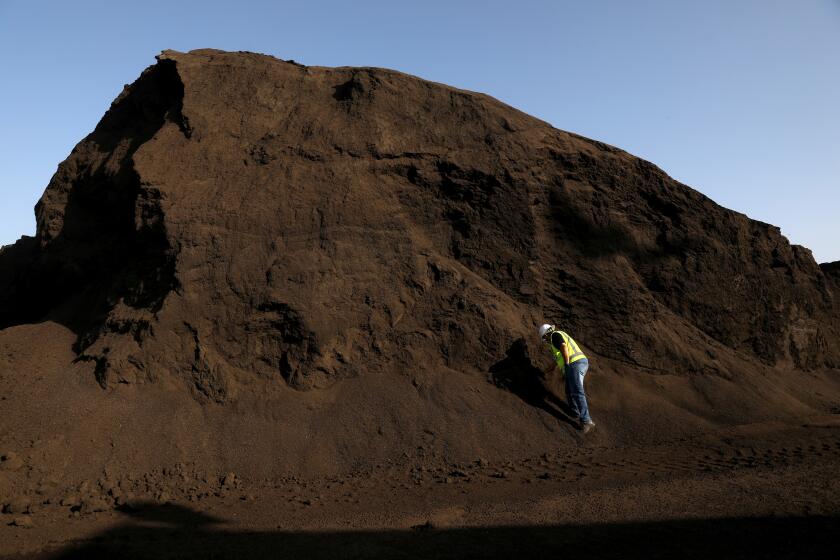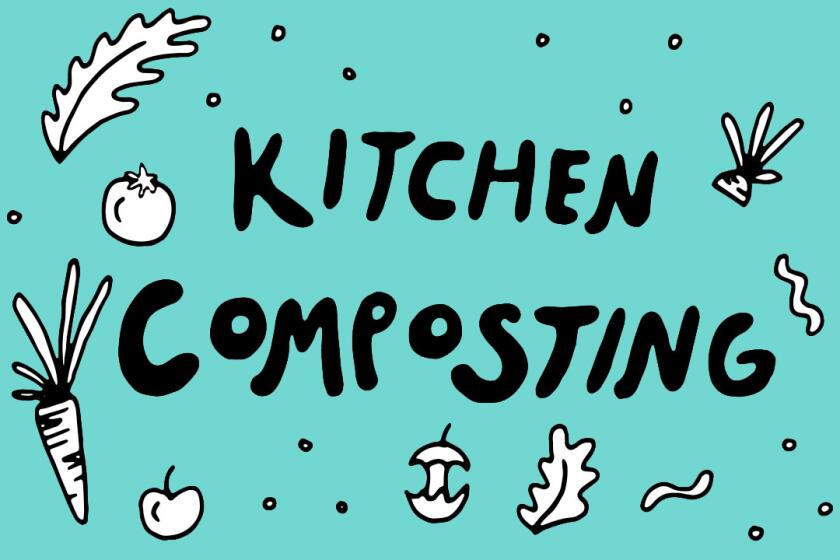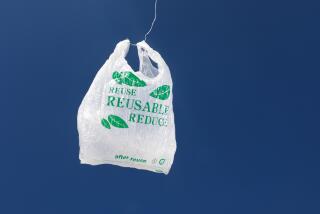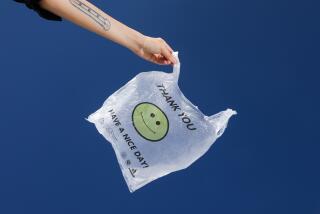California’s new composting law starts Jan. 1. How to recycle your food scraps
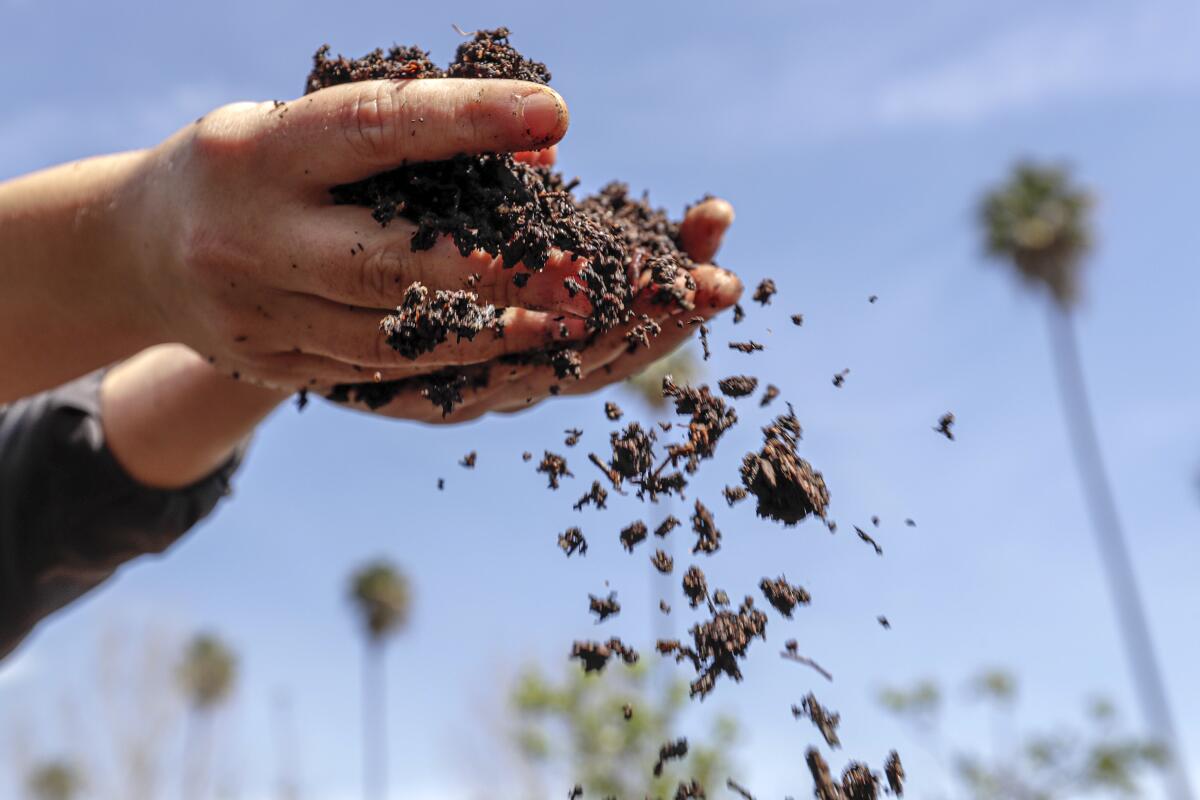
Starting Jan. 1, instead of throwing that container of fuzzy strawberries into the trash, a new law will require Californians to recycle their food scraps and other leftovers.
Senate Bill 1383 mandates that you toss organic material into bins you use for other “green” waste, such as garden trimmings, lawn clippings and leaves. This is part of a larger effort to reduce short-lived climate pollutants (including methane) and redirect organic waste from landfills back to the soil as compost or mulch.
If you’re unsure about how to get started with recycling food waste, here are some tips.
Those banana peels, pizza boxes and coffee grounds you throw away? Starting Jan. 1, local government will need to start composting them, in part to reduce greenhouse gases.
Food that can be recycled
- Coffee grounds, coffee filters and non-nylon tea bags
- Fruit and vegetable scraps (even the moldy parts)
- Egg shells
- Used/dirty paper food containers
- Juice pulp
- Paper towels and tissues
- Paper plates
Some cities accept more food items. For example, Santa Monica also accepts meat, seafood scraps and dairy products. Check with your local municipality to get an exact list of approved food items that can be recycled.
Recycling in your community
The bill directs municipalities to provide organic waste collection services to all residents and businesses. Some cities in Southern California — Santa Monica, El Segundo, Manhattan Beach, Rolling Hills and Costa Mesa — already have a program in place. Others have pilot programs or are gearing up to implement new ones by Jan. 1.
To figure out what collection services your municipality provides, call or visit the website of the city, public works department, sanitation bureau or whatever department is in charge of waste collection.
The city of Los Angeles is currently running a food waste pilot program with 18,000 households. Residents can place their food waste into the green bin along with yard trimmings for collection, said Gerry Villalobos, an environmental specialist for the Bureau of Sanitation.
Other options
Compostable LA is a female- and BIPOC-owned food waste pickup service. Co-owners Monique Figueiredo and Jamie Renee Williams created a subscription-based service that allows you to choose the frequency of waste pickup; their team delivers your waste to its nonprofit partner, LA Compost.
LA Compost is a nonprofit that manages regional composting hubs and community drop-off locations with community partners. It also provides composting education on its website and has a map of local composting sites available for drop-offs.
Orange Compost charges $20 a month to pick up food waste from Anaheim, Fullerton, Orange and Santa Ana residents.
Farmers markets: Figueiredo and Williams suggest checking your local farmers markets for a compost drop-off stand that can be managed by a local organization or farmer.
Community gardens: Figueiredo and Williams said community gardens often have a small space for community composting.
Create your own: If there isn’t a composting site already, talk to your friends and neighbors about starting one.
Recycling in your home
Recycling food waste at home is easy, said Figueiredo and Williams. They recommend starting by separating your vegetable and fruit scraps.
Some cities offer a free or for-purchase countertop composting container. You can also store your scraps in a reusable Tupperware. Just make sure it has a lid.
To stave off odors, Villalobos said, you can layer the food with sawdust or line it with paper towels. You can also put the container in the fridge or freezer.
“The simplest method is putting [the scraps] in a brown paper bag and putting it in your freezer,” Williams said. “And then figure out where you want that to go after, like the farmers market.”
Is reducing your carbon footprint or food waste a New Year’s resolution? Here’s an easy kitchen compost guide to help you get started.
Composting in your backyard
You can buy a composting bin from a store or make one yourself. Los Angeles County Public Works sells up to two backyard composting bins per household for $40 each or worm compost bins for $65 each. The worm bins include African red worms, a common composting worm that processes large amounts of organic matter.
If you decide to put composting bins in your backyard, County Public Works advises against adding meat, dairy or processed foods because they might attract animals. If you’re worried about rodents entering the bin, the department suggests lining the bottom of the bin with a hardware cloth.
Villalobos said it’s not difficult to tend to a compost bin, but you do have to pay attention to it. Mix it regularly and layer your food waste with yard trimmings.
“It may take awhile before you have a good amount of compost that you can harvest to put it in your flowerbeds,” he said. “If you don’t have odor or vermin issues, you’re doing a good job.”
More to Read
Start your day right
Sign up for Essential California for news, features and recommendations from the L.A. Times and beyond in your inbox six days a week.
You may occasionally receive promotional content from the Los Angeles Times.
